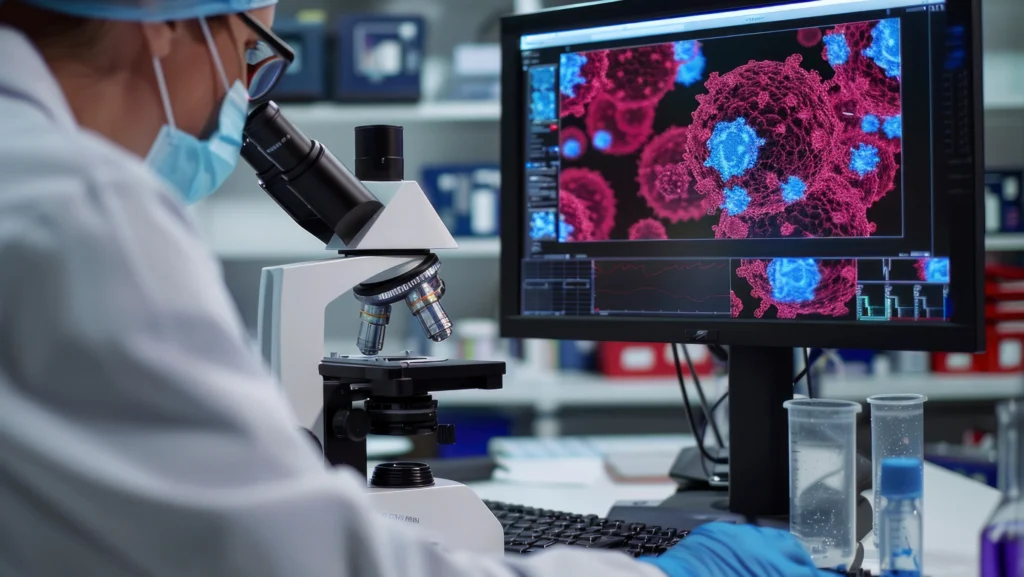Role of Onco Pathology
Onco pathology in Chennai serves as a cornerstone for targeted cancer care by providing precise and timely diagnosis. Expert onco pathologists analyze tissue biopsies to determine cancer type, grade, and stage, directly influencing treatment efficacy. Onco pathology in Vadapalani also offers specialized expertise within this domain.
- Facilitates precise identification of cancer subtypes through advanced molecular profiling, enhancing targeted treatment options and increasing patient-specific therapeutic accuracy.
- Determines comprehensive tumor characteristics, including genetic mutations and receptor status, directly influencing decisions related to chemotherapy, immunotherapy, or targeted therapy modalities.
- Supports robust management strategies by providing in-depth insights into tumor progression, significantly aiding accurate disease prognosis, comprehensive treatment planning, and ongoing patient management.
- Essential for detailed assessment of tumor aggressiveness and metastatic potential, thereby directly impacting patient outcomes, quality of life, and long-term survival prospects.
- Crucial in guiding personalized medicine approaches, significantly improving patient survival rates, minimizing adverse treatment effects, and optimizing overall therapeutic efficacy.
Our skilled specialists in onco pathology in Chennai utilize advanced histopathology techniques, ensuring unparalleled diagnostic accuracy that directly influences therapeutic decisions.
Importance of Cancer Screening Tests
Early detection is critical, and cancer screening tests in Chennai significantly improve prognosis by identifying cancer in its earliest, most treatable stages. Regular screenings enable early intervention, drastically reducing mortality rates and enhancing life expectancy. Early identification of cancer through regular screening greatly increases the chances of successful treatment and survival.
- Detect cancers at early, manageable stages, substantially enhancing the effectiveness and success rates of available treatment modalities.
- Reduce overall healthcare costs, treatment complexity, and hospital stays by identifying diseases before they progress to advanced and complicated stages.
- Offer vital preventive insights for individuals at higher risk, facilitating timely lifestyle modifications, preventive measures, and appropriate medical interventions.
- Comprehensive screening services including mammography, colonoscopy, Pap tests, PSA screenings, and advanced imaging techniques tailored specifically for accurate cancer detection.
Implementing routine cancer screening tests in Chennai enhances the likelihood of complete remission, minimizes invasive treatments, and significantly improves quality of life. Our facility ensures comprehensive cancer screening tests in Chennai, delivering exceptional preventive care.
Comprehensive Diagnostic Approach
Accurate cancer treatment begins with meticulous diagnostic evaluations involving onco pathology in Chennai. Comprehensive diagnosis integrates pathological examinations with imaging techniques to create a full cancer profile. Diagnosis cancer in Chennai is enhanced by our detailed and precision-driven approach.
- Accurate identification of cancer type, subtype, and unique biomarkers, supporting targeted therapeutic approaches and ensuring high efficacy treatment decisions.
- Critical staging and grading of tumors through detailed histological and molecular analyses, significantly influencing the precision and effectiveness of treatment plans.
- Determines the most suitable therapeutic modalities, ensuring the highest standard of care and optimal therapeutic outcomes tailored to each patient’s unique profile.
- Facilitates continuous monitoring of disease progression and precise evaluation of treatment response, enabling timely adjustments to therapy and proactive management.
At our center, precision-driven onco pathology in Chennai ensures each patient receives an accurate assessment, leading to highly targeted and effective treatment strategies that maximize outcomes.
Advanced Techniques in Onco Pathology
Modern onco pathology in Chennai incorporates sophisticated diagnostic methodologies like immunohistochemistry, molecular profiling, and genetic testing. These advanced techniques provide deeper insights into cancer biology, enabling oncologists to develop highly effective individualized therapies. Onco pathology in Vadapalani employs similarly advanced methods.
- Immunohistochemistry for accurately identifying specific biomarkers and tumor receptors, significantly enhancing the precision of targeted treatment strategies.
- Genetic sequencing techniques employed to uncover critical mutations, guiding the selection of targeted therapies and predicting patient responses, thereby optimizing treatment outcomes.
- Digital pathology technologies significantly enhancing diagnostic precision, consistency, and reproducibility, enabling streamlined and accurate pathology assessments.
- Molecular pathology for highly personalized cancer management, enabling detailed analyses of genetic and molecular tumor profiles, significantly improving therapeutic personalization and precision.
By integrating these advanced diagnostic methods, onco pathology in Chennai significantly boosts therapeutic precision, ensuring treatments are more effective, less invasive, and precisely matched to the patient’s unique cancer profile.
Cancer Treatment Tailored by Onco Pathology
The integration of onco pathology in Chennai into cancer care ensures that therapeutic strategies are meticulously tailored to the individual patient’s cancer type, genetics, and response profile. Through detailed pathological analysis, treatments become more targeted, significantly improving patient prognosis and quality of life. Diagnosis cancer in Chennai leverages these meticulous evaluations.
- Personalized chemotherapy regimens tailored specifically based on detailed genetic profiling, markedly enhancing treatment efficacy and reducing potential adverse reactions.
- Immunotherapy treatments precisely matched to specific tumor markers identified through pathological analysis, significantly improving patient response rates and outcomes.
- Radiation Therapy for cancer accurately guided by detailed pathology reports, maximizing precision, minimizing collateral damage to healthy tissue, and enhancing overall effectiveness.
- Early detection and vigilant monitoring of recurrence through detailed pathological surveillance, significantly improving management strategies, patient prognosis, and long-term survival rates.
At our facility, the insights provided by onco pathology in Vadapalani and onco pathology in Chennai enable us to craft a highly personalized approach, vastly improving patient experience and treatment efficacy.
Why Choose Us?
Choosing the right place for diagnosis cancer in Chennai ensures accurate results and timely treatment. Here’s why our center stands out:
- Expert Team: We are home to the best oncologist in Chennai and a highly skilled team of Onco pathologists. Our experts work closely together to ensure precise diagnoses and effective treatment plans tailored to each patient.
- Advanced Screening Methods – We offer the latest cancer blood test in Chennai to detect cancer early.
- Experienced Specialists – Our team includes skilled oncologists and healthcare professionals.
- State-of-the-art Facilities – Equipped with modern diagnostic tools for precise detection.
- Personalized Treatment Plans – Customized treatment based on each patient’s needs.
- Affordable Cancer Diagnosis – High-quality care at reasonable costs.
- Compassionate Care – We support patients throughout their journey, from diagnosis to treatment and recovery.
Our comprehensive cancer screening test in Chennai is designed to provide quick and reliable results for better health management.




